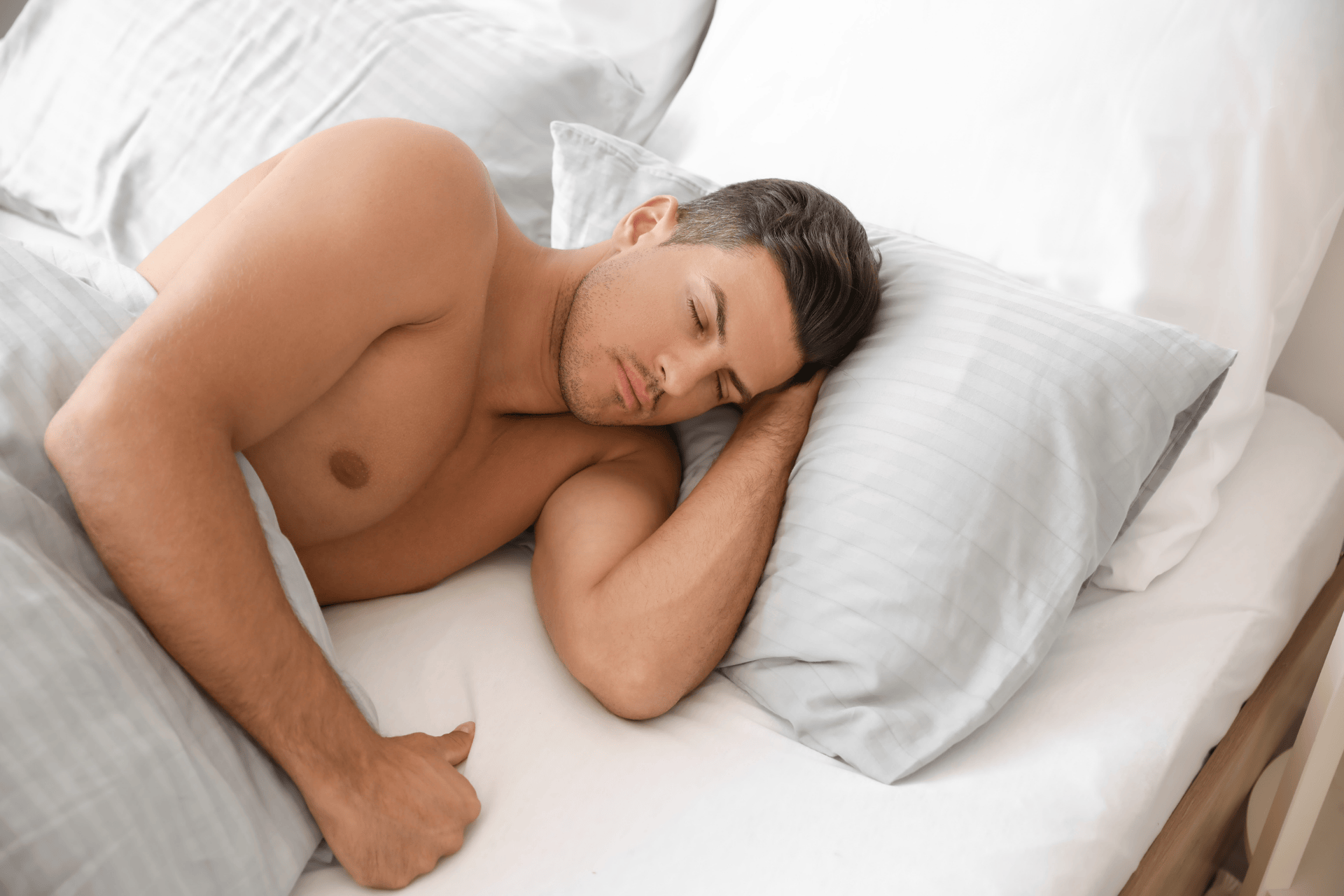Does Sleeping Naked Boost Testosterone Naturally?
Many people wonder if something as simple as sleeping naked can help increase testosterone levels naturally. Testosterone is a key hormone that affects energy, mood, muscle [...]
Read More
Medically reviewed by Alan Lucks | MD, Alan Lucks MDPC Private Practice - New York on November 13th, 2025.
Testicles function optimally at 94-96°F (2-4°F below core body temperature), and restrictive sleepwear or overheating can impair hormone production in these temperature-sensitive organs.
The body produces 95% of daily testosterone during deep sleep phases, particularly between 4-8 AM, making sleep quality crucial for maintaining healthy hormone levels.
Research shows that men getting less than 5 hours of sleep nightly have testosterone levels 10-15% lower than those getting 7-8 hours of quality rest.
Natural hormone optimization requires zinc intake of 11mg daily, vitamin D levels above 30 ng/mL, and regular resistance training which can boost production by 15-20%.
Warning signs of low testosterone include persistent fatigue despite adequate sleep, decreased morning erections, unexplained loss of muscle mass, and reduced motivation lasting more than 2-3 months.
Many people wonder if something as simple as sleeping naked can help increase testosterone levels naturally. Testosterone is a key hormone that affects energy, mood, muscle strength, and overall health, especially in men. This article explores whether sleeping without clothes can really make a difference and what other natural ways exist to support healthy testosterone levels.
 How Testosterone Works and Why It Matters
How Testosterone Works and Why It MattersTestosterone is a hormone mainly produced in the testicles for men and in smaller amounts in women's ovaries. It plays a big role in muscle growth, bone health, and sex drive. Levels naturally drop with age, but low testosterone can cause fatigue, low mood, and reduced muscle mass.
Because testosterone is so important, many look for easy ways to keep it at healthy levels. Lifestyle habits like diet, exercise, and sleep quality all influence testosterone. But what about sleeping naked?
Sleeping naked can actually have a positive impact on testosterone production. When the body is exposed to cooler temperatures, it can enhance the production of this vital hormone. The testicles, which are responsible for testosterone production, function best at slightly lower temperatures than the body's core. By allowing them to remain cool during sleep, men may help maintain optimal testosterone levels. Sleeping without clothing can promote better sleep quality, which is crucial since poor sleep has been linked to lower testosterone levels.
The psychological benefits of sleeping naked should not be overlooked. Many people report feeling more liberated and relaxed when they shed their clothes for the night. This sense of comfort can lead to reduced stress and anxiety, both of which are known to negatively impact hormone levels. The skin-to-skin contact that can occur when sleeping naked, especially for couples, may enhance intimacy and connection, further contributing to overall well-being and potentially boosting testosterone levels through increased emotional bonding.
Testosterone production is sensitive to temperature. The testicles need to be slightly cooler than the rest of the body to produce testosterone efficiently. This is why they hang outside the body in the scrotum. Overheating can reduce sperm and testosterone production. The body has a natural mechanism for regulating temperature, and when this balance is disrupted, it can lead to various hormonal imbalances.
Sleeping naked may help keep the body cooler at night, which some believe supports better testosterone production. Cooler temperatures during sleep can improve overall sleep quality, and good sleep is linked to healthier hormone levels, including testosterone. In fact, studies have shown that deep sleep, which is often more achievable in a cooler environment, is crucial for the body's recovery processes and hormone regulation. This means that the benefits of sleeping naked could extend beyond just temperature regulation, potentially enhancing overall well-being.
Direct studies on sleeping naked and testosterone are limited. However, research shows that keeping the testicles cool is important for hormone health. Wearing tight or heavy clothing to bed can increase temperature, possibly lowering testosterone over time. The choice of sleepwear can also affect skin health and comfort, which, in turn, can influence sleep quality. Fabrics that trap heat and moisture can lead to discomfort and restless nights, further complicating the relationship between sleep and hormone levels.
Sleeping naked might help maintain a cooler body temperature, reducing heat stress on the testicles. This could support natural testosterone production, but it is just one small factor among many that affect hormone balance. Lifestyle factors such as diet, exercise, and stress management also play critical roles in hormone health. For instance, engaging in regular physical activity can boost testosterone levels, while chronic stress can lead to elevated cortisol, which negatively impacts testosterone production. Therefore, while the practice of sleeping naked may contribute to a more favorable environment for testosterone production, it should be considered as part of a holistic approach to health and wellness.
Good sleep is key to hormone health. Testosterone levels rise during deep sleep, so getting 7-9 hours of restful sleep each night helps maintain healthy levels. Avoid screens before bed, keep your bedroom dark and cool, and stick to a regular sleep schedule.
Strength training and high-intensity workouts can boost testosterone. Lifting weights, sprinting, or bodyweight exercises done regularly support muscle growth and hormone balance. Even moderate exercise helps reduce stress, which can negatively affect testosterone.
Eating enough protein, healthy fats, and vitamins is important. Foods rich in zinc (like nuts and seeds) and vitamin D (from sunlight or supplements) support testosterone production. Avoid excessive sugar and processed foods that can disrupt hormone levels.
Chronic stress raises cortisol, a hormone that can lower testosterone. Finding ways to relax through meditation, hobbies, or spending time outdoors can help keep stress and cortisol in check.
If you feel tired, have a low sex drive, or notice muscle loss, low testosterone might be a cause. It is important to get a proper diagnosis before trying treatments. Telehealth services like Doctronic.ai offer quick, affordable video visits with doctors who can evaluate your symptoms and order tests if needed.
Doctronic.ai provides 24/7 telehealth visits for less than $40, making it easy to get expert advice from home. Their AI-powered system can also give you instant answers to health questions, helping you understand your options before seeing a doctor.
 Tips for Better Sleep and Hormone Health
Tips for Better Sleep and Hormone HealthSet the thermostat between 60-67°F (15-19°C) for optimal sleep.
Use breathable bedding and avoid heavy pajamas.
Consider sleeping naked to help regulate body temperature.
Go to bed and wake up at the same time every day.
Limit caffeine and alcohol before bedtime.
Wind down with relaxing activities like reading or gentle stretching.
Exercise regularly, but avoid intense workouts right before bed.
Include foods rich in zinc, magnesium, and vitamin D.
Stay hydrated, but reduce fluids before sleep to avoid waking up.
Getting medical advice about hormone levels is easier than ever with telehealth platforms like Doctronic.ai. You can have a video visit with a licensed doctor anytime, from anywhere in the US. This is especially helpful if you want to discuss symptoms, get lab orders, or explore treatment options without waiting weeks for an appointment.
Doctronic's AI doctor also offers free, instant answers to health questions on their website. This can help you learn more about testosterone and other health issues before talking to a real doctor, making your visit more productive.
While sleeping naked may help keep your body cooler and support testosterone production, it is only one part of a healthy lifestyle. Combining good sleep habits, regular exercise, balanced nutrition, and stress management will have a bigger impact on your hormone health.
If you suspect low testosterone or want personalized advice, consider a telehealth visit with doctors at Doctronic.ai. They can provide guidance, testing, and treatment options tailored to your needs quickly and affordably.
Sleeping naked may help keep the testicles cooler, which is good for testosterone production, but it alone is unlikely to cause a significant increase. It works best combined with other healthy habits.
Testicles need to be cooler than the rest of the body to produce testosterone properly. Overheating can reduce hormone production and sperm health.
Yes, testosterone levels rise during deep sleep. Poor sleep quality or not enough sleep can lower testosterone.
Regular exercise, a balanced diet, good sleep, and stress management are key. Avoid tight clothing that traps heat around the testicles.
If you experience symptoms like fatigue, low sex drive, or muscle loss, it’s a good idea to get tested. Telehealth services like Doctronic.ai make it easy to consult a doctor remotely.
Hormonal Imbalance: Causes, Symptoms & Treatment - Cleveland Clinic
What are normal testosterone levels? Ages, males, females, and more - Medicalnewstoday
While cooler sleep conditions may provide minor benefits, the temperature effect alone won't significantly impact hormone levels—focus on getting 7-9 hours of quality sleep, regular strength training, and proper nutrition for meaningful results. If you're experiencing persistent symptoms like fatigue or decreased libido despite lifestyle improvements, Doctronic can help you understand when testosterone testing might be appropriate.
Many people wonder if something as simple as sleeping naked can help increase testosterone levels naturally. Testosterone is a key hormone that affects energy, mood, muscle [...]
Read More